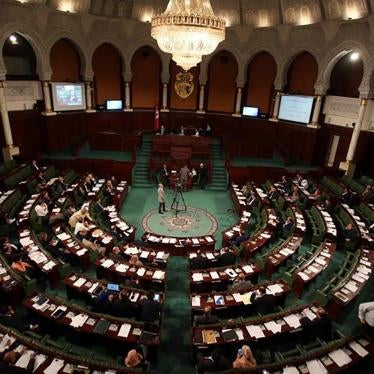On Sept. 13, the Tunisian parliament adopted a law that could threaten its hard-won fledgling democracy. The “administrative reconciliation law” will grant complete impunity to civil servants who were implicated in corruption under former dictator Zine El Abidine Ben Ali and allow them to return to positions of power. It will also obstruct any investigation into the systematic corruption that prevailed in Tunisia for decades, and prevent courts from ruling on human-rights violations.
Ben Ali was ousted from power six years ago following a popular uprising. According to a 2012 report by a national commission tasked with investigating corruption and embezzlement of public funds, Ben Ali's family and friends used government institutions such as state banks, the police, and the justice system to appropriate public funds and land, and to punish those who tried to stand up to them. After his removal, Tunisia underwent a democratic transition. It adopted a new Constitution in January 2014, which upheld key civil, political, social, economic, and cultural rights, and conducted free and fair presidential and legislative elections. But these gains remain fragile and a relapse into authoritarianism is still possible if the authorities adopt policies at odds with the principles of democracy, justice, and accountability for abuses.
President Beji Caid Essebsi proposed the law during a March 20, 2015, speech celebrating the anniversary of the country’s independence. Initially, it was intended to “improve the investment climate” by granting amnesty to government officials and businessmen who returned stolen money, and by ending the prosecution of such cases. According to Essebsi, the reclaimed money would be used for national development projects.
Although the law was intended to promote reconciliation, it did the opposite. It provoked stormy debates in parliament, incited demonstrations in the streets, and divided public opinion.
The law that was ultimately passed distinguished between civil servants who allegedly committed acts of corruption without personally benefiting, and those who embezzled public funds for their own gain. This was intended to punish people acting on their own volition, and to protect civil servants who had followed illegal orders given by the president or members of his inner circle. For the latter group, the law called off all prosecutions, provided amnesty to those already convicted, and compensated them for any fines they had been forced to pay.
This distinction was an illusion. There was never a way to identify or investigate civil servants who had allegedly profited from corruption. The law does not institute any judicial processes to separate those with ill-gotten gains from those who had simply executed orders. Nor does it cover indirect gains, such as promotions or benefits for a person’s family. As a result, it is highly unlikely to be an effective tool against anyone who has benefited from or been an accomplice to misappropriation.
Moreover, by allowing civil servants who participated in corruption to redeem themselves without paying damages or disclosing facts, the law turns them into victims. It amounts to an admission by the government that the way it acted toward them was wrong. In an absurd turn of events, corrupt people will receive government compensation for their misbehavior.
Finally, the law will undermine the work of Tunisia’s Truth and Dignity Commission (IVD), whose mandate is to investigate corruption and arbitrate cases or refer suspects to the justice system. In a breach of the principles of transitional justice, the law will prevent disclosures about acts of corruption and stop people from taking responsibility for criminal actions. This will entrench Tunisians’ deep suspicion of a system that has still not made a clean break with the past. It will also obstruct the government’s ability to evaluate the integrity and aptitude of government representatives and civil servants.
It is hard to see how such a law can restore trust in government institutions. The only trust that will be restored is that of corrupt individuals, who will be rewarded for their services and have their judicial records wiped clean. Granting impunity for corruption and systematic human-rights violations can only entrench a culture of unlawfulness and signal that these reprehensible practices will be tolerated. Far from working toward “reconciliation,” this law eliminates individual responsibility for corruption and paves the way for such practices to continue.








